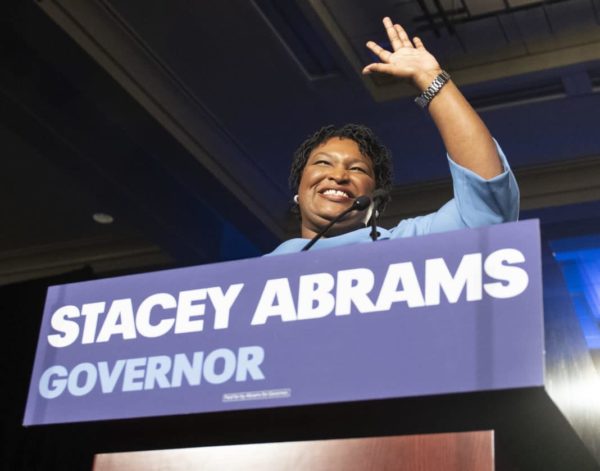ATLANTA (AP) — His election still undecided, Republican Brian Kemp is proceeding as a victorious candidate and promising to be a governor for all Georgians. That might not be so easy.
Should his narrow lead hold over Democrat Stacey Abrams and ultimately send him to the governor’s mansion, Kemp would face lingering questions about how and why he oversaw his own election as secretary of state. His victory would be fueled by an even starker than usual urban-rural divide, with Abrams drawing most of her votes in metro Atlanta and smaller cities, and Kemp running up massive margins in rural and small-town Georgia, eclipsing 85 percent in some counties.

Georgia Democratic gubernatorial candidate Stacey Abrams speaks to supporters about a suspected run-off during an election night watch party, Tuesday, Nov. 6, 2018, in Atlanta. Abrams, the first black woman to be a major party nominee for governor in the United States, faced Republican challenger Georgia Secretary of State Brian Kemp. (AP Photo/John Amis)
Then there’s his embrace of President Donald Trump’s coarse rhetoric, from Kemp warning about “illegal votes” to his promise to “round up criminal illegals” in his own pickup truck.
That all plays into what civil rights leaders and observers from both parties describe as a bitter, race-laden contest that pitted Abrams’ bid to become the nation’s first black woman governor against Kemp’s fierce effort to preserve his overwhelmingly white party’s hold on a growing, diversifying Deep South state.
The after-effects, they say, won’t dissipate automatically.
“In the hypothetical scenario that Brian Kemp becomes governor,” said NAACP activist and former congressional candidate Francys Johnson, “then he and Donald Trump will have both won because they were able to stoke the deepest darkest fears among their base.”
Some Republicans acknowledge the atmosphere even as they defend Kemp from charges he ran a racially and culturally divisive campaign. “Some of this is beyond Brian Kemp’s control,” said Brian Robinson, a former adviser for outgoing Gov. Nathan Deal and for Kemp’s vanquished GOP primary rival. “Brian Kemp cannot extricate himself from the national political environment that now drives every election down to the county level. You run for coroner, you have to say whether you want to ‘make America great again.'”
For his part, Kemp notes “a very polarizing climate that we’ve been in.” But he defends his pledge to “put Georgians first” — a rhetorical cousin to Trump’s “America First” — and he rejects any notion that he could take office under a cloud that would make his job harder.
“It was a tough election,” Kemp said as he stood in the governor’s office two days after the Nov. 6 election, resigning as secretary of state to focus on a January transfer of power. He cited a “clear and convincing” result — returns showed him with 50.3 percent at the time — and he pointed back to his multiple terms as a state senator who represented what was then a swing district: “I’m going to serve this whole state and move forward with the plans we have.”
Undeterred, Abrams’ campaign filed a federal lawsuit Sunday asking a judge to delay the vote certification deadline by one day and make officials count any votes that were wrongly rejected. If successful, the suit would prevent officials from certifying county vote totals until Wednesday and could restore at least 1,095 votes that weren’t counted. The campaign said thousands more ballots could be affected.
A campaign spokesman for Kemp said in a statement Monday the lawsuit shows Abrams has “moved from desperation to delusion.” Adding that her commitment to waiting out until every vote is counted is “a disgrace to democracy.”
“Stacey Abrams lost,” Kemp spokesman Ryan Mahoney said, “and her concession is long overdue.”
Leading up to the election, Abrams called Kemp “an architect of suppression.” Kemp says he’s faithfully enforced state and federal elections laws, though that’s not convinced some voters.
Nina Durham, a 50-year-old Powder Springs resident was among a small a group of protesters outside Deal’s office last week as Kemp spoke. She said she didn’t have confidence in the results. Asked whether she could see Kemp as her governor, Durham, who is African-American, replied, “No. He hasn’t represented me as secretary of state.”
Unofficial returns show Kemp leading by about 60,000 votes out of more than 3.9 million votes cast. That’s enough for a narrow majority, but Abrams asserts that enough uncounted absentee, early and provisional ballots remain to bring Kemp below a majority threshold. That would trigger a Dec. 4 runoff.
The Associated Press has not called the race. The AP will revisit its decision after Tuesday’s deadline for Georgia’s 159 counties to send certified results to the state.
Neighboring Florida also is caught in a contested governor’s race. Democrat Andrew Gillum, trailing Republican Ron DeSantis in unofficial returns, also would make history as his state’s first black governor. The Gillum-DeSantis campaign was infused with race, but Florida’s electorate — with its racial and ethnic complexities transcending a Deep South history of black-white politics— has grown accustomed to narrowly divided results.
Robinson, the former Deal adviser, noted the razor-thin general elections are mostly new to Georgia. Eight years ago, Deal ran 10 percentage points ahead of his Democratic opponent; the margin was 7 percentage points, but Deal has managed to draw job approval ratings higher than his vote percentages. Trump won Georgia by 5 points in 2016, but barely cleared a majority. Now Kemp stands about at Trump’s vote percentage with Abrams on his heels.
“Brian did what he had to do to win,” Robinson said. But, “In two years, we will be at parity or a slight Democratic advantage. … His re-election in a purple state already has to be under way” and “he has to be seen in minority communities, and not just African-American.”
Robinson noted Deal’s work with black lawmakers — including Abrams — on a criminal justice overhaul that is reducing mass incarceration, particularly among young black men. He said Kemp could find ways to relax his opposition to expanding Medicaid insurance, perhaps “allowing legislators from both parties to take the lead” on some compromise that could draw more federal money to Georgia’s health care system. Expanding Medicaid is Abrams’ top policy priority.
Ben Williams, a Southern Christian Leadership Conference leader in suburban Atlanta’s Cobb County, said Kemp must acknowledge— if not apologize — for some elements of the campaign. Williams pointed to a photo of Kemp standing with a supporter later identified as a white supremacist. Kemp’s campaign distanced itself at the time, noting Kemp agreed to snapshots with anyone who asked at his public rallies.
In the campaign’s closing days, Kemp criticized a robocall from an out-of-state white supremacy group impersonating Oprah Winfrey and describing Abrams in racist terms. But he took heat for his campaign’s official Twitter account sending out a photo of purported Black Panthers holding Abrams’ campaign signs and calling it proof of her radicalism. There was no proof of the affiliation of those pictured, and they were not with Abrams’ campaign.
Williams said it adds up to a “blatantly racist” effort, intentional or not.
Kemp and Deal have sidestepped mentions of race. But Deal seemingly gave a nod to the sensitivities when he tapped one of his Cabinet members to succeed Kemp as secretary of state. Robyn Crittenden is the first African-American woman to serve as a statewide constitutional office in Georgia.
For all their skepticism, Williams and Johnson predicted Kemp’s leading critics always would be willing to meet with him.
Said Johnson: “In civil rights work, our mantra is this: No permanent friends, no permanent enemies, just permanent issues.”


